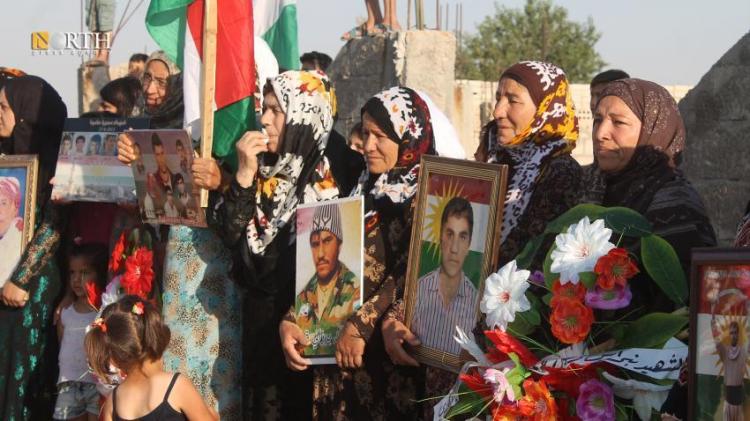Tragedy of Amude – reconciliation efforts clash with demand to prosecute those responsible
AMUDE, Syria (North Press) – The families of the victims of the tragedy of Amude have called for the trial of responsible military and political leaders in northeastern Syria during a clash between protesters from the city of Amude and the People's Protection Units (YPG) in June 2013, which resulted in casualties.
The group read a statement signed on behalf of the families of the martyrs of Amude on Saturday during a ceremony commemorating the seventh anniversary of the incident in the city’s cemetery, which falls on June 27, in the presence of the families of the incident's victims, in addition to the participation of representatives and supporters of the Kurdish National Council (ENKS, a group of Kurdish political parties allied with the Turkish-backed opposition Syrian National Coalition) in Syria.
A day after the ceremony, YPG spokesperson Nouri Mahmoud announced that they assumed responsibility for the tragedy, adding, "We acknowledge the grave mistake that killed innocent people as a result of a clash between one of our military units that was returning from the front, and demonstrators gathered to release activists arrested by the internal security forces (Asayish), and we will do everything necessary."
Abdelqader Wati, a social figure from Amude and a member of the Magistrates' Committee, told North Press the latest result of their meetings with the families of the victims and the local council that represented them in the negotiation was to reach a final multi-point paper.
According to Wati, the demands included a public apology to the residents of Amude and the families of the victims, formal recognition of the responsibility for the incident, a willingness to provide material and moral compensation to the families, and official consideration for the victims as martyrs who have the privileges of the martyrs of the Syrian Democratic Forces (SDF).
Wati said the SDF Commander-in-Chief Mazloum Abdi, expressed his willingness to implement the demands, and he sent a message to the families, adding they heard the demand for a trial for those responsible for the incident two days ago. However, they discussed it earlier, and reached a common understanding with the families stating that holding a trial would be ineffective, so they removed this clause from their demands.
Wati stressed the most appropriate solution to solve the problem of Amude is to establish reconciliation between families and the YPG.
The statement issued by the families of the victims had described the recent initiatives that seek to establish reconciliation between the families and the YPG as positive, referring to the initiative taken by Mazloum Abdi, who commissioned a committee of the city's residents to mediate, communicate, and establish reconciliation between the families and the YPG.
Ahmed Omar, one of the families of the victims, told North Press, "Public apology alone is not enough. Rather, those responsible must be held accountable and the units committed a crime against people in Amude, and these officials still hold high positions in the Autonomous Administration."
Abdi announced on Saturday they were ready to do everything possible to heal this wound in the history of the Rojava revolution, and to offer apologies and moral and material compensation to the affected and the families of the martyrs in the city of Amude.
Ali Bakkari, the head of the local council ENKS council in Amude, said they adopted the representation of the families of the victims to negotiate with the reconciliation committee, which was commissioned by Abdi as part of his initiative, which conveyed several messages between the two parties during the previous period.
Bakkari told North Press they had reached a good understanding with the committee, the final word belongs to the families, and they would have to put pressure on them to some extent to push reconciliation towards success.
Bakkari noted the families initially demanded the formation of a Kurdish court to try those responsible for the incident and it was agreed through the reconciliation committee on the issue of recognition after a major effort by the council with the families and convincing them that it is impossible to conduct a trial.
Bakkari stressed they will try to find a formula or a way out for the trial request, provided that both parties are satisfied and serve the reconciliation.
(Reporting by Abdelhalim Suleiman, editing by Lucas Chapman)

